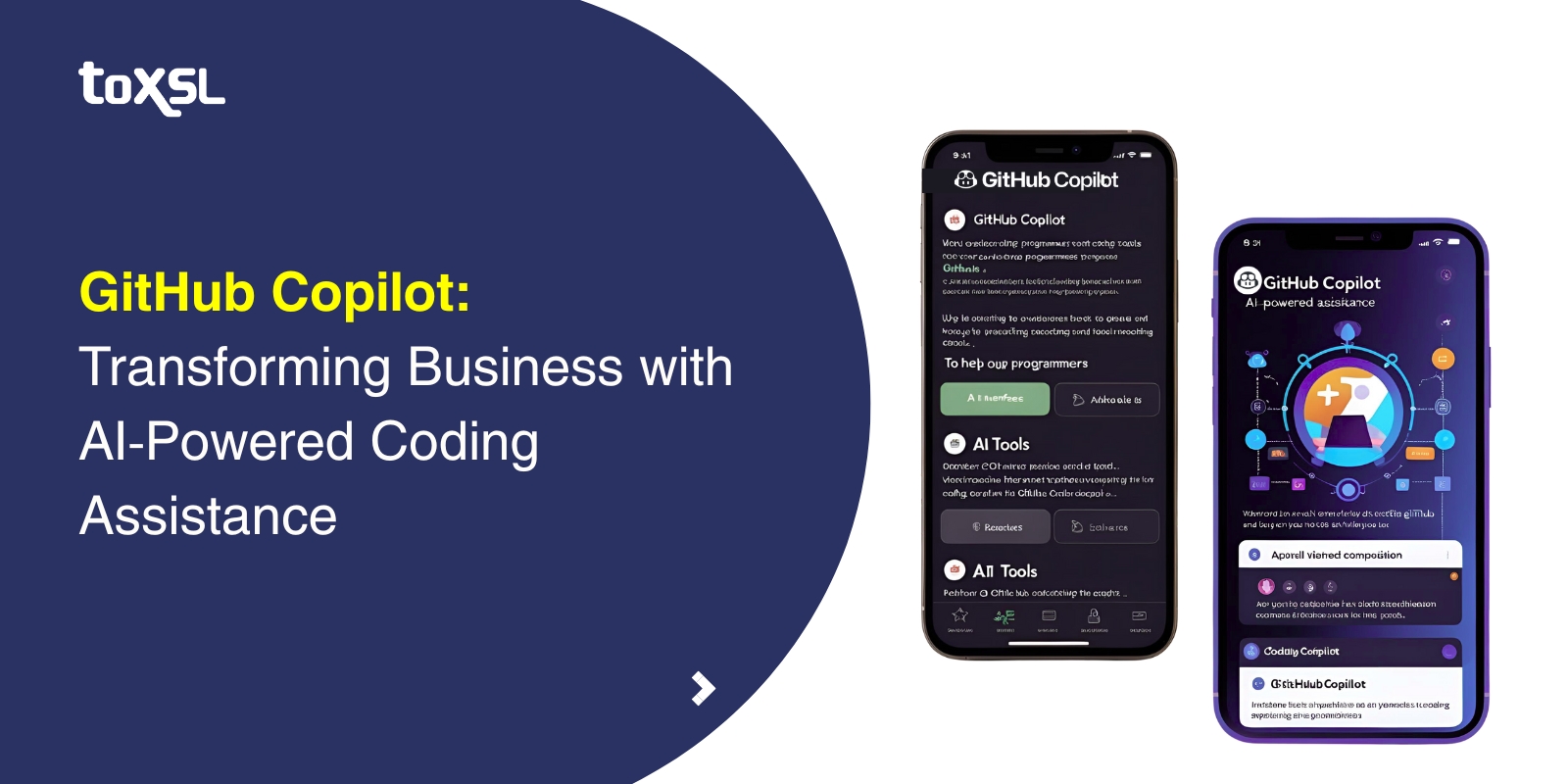- Jun 12, 2025
Share this post on:

Technology moves fast, and businesses need to move faster. Whether you’re building websites, mobile apps, or internal tools, writing code takes time and skilled developers. But now, with the help of artificial intelligence (AI), there's a smarter way to write software.
GitHub Copilot, an AI-powered coding assistant developed by GitHub in collaboration with OpenAI, is reshaping how developers write code and how businesses approach software projects. This blog post explores what GitHub Copilot is, how it works, and the significant benefits it offers businesses of all sizes.
Key Takeaway
- AI Coding Partner: GitHub Copilot serves as a smart AI assistant that writes, completes, and even debugs code.
- Boosts Productivity: Developers save time on repetitive tasks, improving speed and focus.
- Improves Code Quality: Offers cleaner, consistent, and error-resistant code.
- Reduces Costs: Cuts development time and outsourcing needs.
- Enterprise-Ready: Scales securely with business needs and integrates into existing workflows.
What is GitHub Copilot?
GitHub Copilot is an AI-driven coding assistant designed to help developers write code more efficiently by providing context-aware code suggestions, completing code snippets, and even autonomously making code changes. Launched initially as a code completion tool, Copilot has evolved into a sophisticated AI agent capable of understanding project context, generating entire functions, and collaborating with developers to address coding tasks. At its core, GitHub Copilot acts as an AI pair programmer, powered by advanced language models such as OpenAI’s GPT-4 and Google’s Gemini. It integrates seamlessly with popular integrated development environments (IDEs) including Visual Studio Code, Visual Studio, JetBrains IDEs, Azure Data Studio, Xcode, Vim/Neovim, and Eclipse, making it accessible to a broad developer audience.
Key features of GitHub Copilot
Here are the key features of GitHub Copilot:
Code Completion: Auto complete-style suggestions that predict and generate code snippets as developers type.
Copilot Chat: An interactive chat interface that allows developers to ask coding questions and receive explanations or code snippets in real time.
Copilot Coding Agent: An autonomous AI agent that can be assigned GitHub issues and independently make code changes, create pull requests, and iterate on solutions for human review.
This evolution from a simple autocomplete tool to a fully autonomous coding agent marks a significant leap in AI-assisted software development, enabling businesses to leverage AI not just as a helper but as an active participant in their coding teams.
Also Read: Generative AI vs. Predictive AI: Exploring the differences
GitHub Copilot: Working Process
GitHub Copilot’s working process is designed to keep developers in a "magical flow state" by reducing interruptions and providing timely, relevant coding assistance throughout the development lifecycle.
1. Contextual Understanding: Copilot continuously analyzes the codebase, comments, and documentation, and even opens GitHub issues to understand the context of the task at hand. This deep contextual awareness allows it to generate highly relevant code completions and suggestions tailored to the specific project and coding style.
2. Code Generation and Suggestions: As developers write code, Copilot offers autocomplete suggestions that can range from a single line to entire functions or classes. It uses patterns learned from billions of lines of open-source code and proprietary models to predict what the developer intends to write next, speeding up the coding process significantly.
3. Interactive Chat Assistance: Through Copilot Chat, developers can ask natural language questions related to coding problems, debugging, or best practices. The chat interface is available both within IDEs and on the GitHub website, providing a conversational way to interact with the AI assistant and receive explanations, code snippets, or debugging help instantly.
4. Autonomous Coding Agent: One of the most transformative features is the Copilot coding agent, which can be assigned specific GitHub issues. The agent autonomously plans, writes, tests, and iterates on the code changes needed to resolve the issue. It then creates a pull request for human review, allowing developers to focus on higher-level design and review tasks rather than routine coding.
5. Continuous Learning and Improvement: Copilot continuously learns from interactions and feedback, improving its suggestions and adapting to the team’s coding standards and preferences. Features like Copilot Spaces allow teams to organize relevant project context—code, documentation, notes—in one place, enabling smarter, more accurate AI assistance.
6. Integration with Enterprise Workflows: For businesses, Copilot integrates with enterprise-level tools and workflows, supporting access controls, security policies, and collaboration features. This ensures that AI assistance aligns with organizational standards and compliance requirements
Benefits of GitHub Copilot for Businesses
GitHub Copilot can change the way businesses develop software. It helps teams work faster, smarter, and more creatively. Here’s how it can make a difference:
1. Faster Development: Copilot suggests code as you type and can even take care of repetitive coding tasks automatically. This means developers spend less time writing the same old code or searching for answers. Sometimes, Copilot can even handle whole tasks by itself, which speeds up the whole project.
2. Better Code Quality: Since Copilot learns from a huge amount of good-quality code, it knows the best ways to write code. It can easily spot mistakes and help keep the code consistent across the whole team. This means fewer bugs and more reliable software.
3. More Productive Developers: By taking over boring or repetitive parts of coding, Copilot frees developers to focus on the more interesting and challenging parts of their work. Plus, its chat feature acts like a helpful mentor, answering questions and guiding developers, which makes work more enjoyable and helps teams keep their best people.
4. Saving Money: Because Copilot speeds up coding and testing, companies can get more done with fewer resources. This might mean smaller teams or less need to hire outside help. Faster development also means products get to market sooner, which saves money and brings in revenue quicker.
5. Easy Teamwork: Copilot works well with the tools developers already use, like code editors and project trackers. It understands the project and the team’s style, so the code it suggests fits right in. This makes working together smoother and less stressful.
6. Grows with Your Business: For bigger companies, Copilot offers extra features to keep things secure and organized. Teams can customize how Copilot works with their projects and knowledge, making it easier to scale up and keep control as the business grows.
Conclusion
GitHub Copilot is changing the game in software development. By bringing Artificial Intelligence directly into the coding process, it helps businesses write code faster, improve quality, and make developers more productive. It can even take on some tasks by itself, allowing teams to focus on bigger challenges and innovate more quickly. This gives companies a real edge in today’s fast-moving tech world. As AI technology keeps improving, GitHub Copilot will become an even more powerful tool. It is not just as a helpful assistant but a smart coding partner. Adopting GitHub Copilot today means your business is ready to lead in the future of AI-driven software development. Want to learn more? Contact us today.
FAQs
Q1. What can GitHub Copilot do inside GitHub?
Within the GitHub ecosystem, Copilot can:
- Write new code based on assigned issues
- Generate test cases and documentation
- Interpret inline comments and code context
- Create pull requests autonomously (Copilot Coding Agent)
- Collaborate on code changes for better team productivity
Q2. Is ChatGPT better than GitHub Copilot for coding?
Both tools are AI-powered but serve different roles:
- ChatGPT is ideal for natural language understanding, explaining concepts, and general problem-solving.
- GitHub Copilot is built for in-IDE coding, offering project-specific, contextual code suggestions.
- For developers embedded in a coding workflow, Copilot is more practical due to its seamless integration with IDEs and understanding of code context.
Q3. How much does GitHub Copilot like ai assistance cost?
Individual Plan: $10/month or $100/year
- Free Access: Available to verified students, teachers, and open-source maintainers
- Business Plan: Custom pricing with features like user management, organization policies, centralized billing, and security controls
Q4. What programming languages does Copilot support?
GitHub Copilot supports a wide variety of languages, including but not limited to:
- JavaScript, Python, TypeScript, Go, Java, C#, C++, Ruby, PHP, HTML, CSS, SQL, and Shell scripting.
- It performs best in languages with large open-source datasets.
Q5. How does GitHub Copilot improve productivity?
Copilot accelerates development by:
- Reducing time spent on repetitive or boilerplate code
- Offering quick access to solutions and syntax
- Helping developers focus on problem-solving rather than syntax recall
- Supporting faster onboarding for new team members
Q6. How does GitHub Copilot enhance code quality?
Copilot:
- Suggests clean and consistent code patterns
- Adheres to best practices learned from billions of code lines
- Minimizes bugs through intelligent autocomplete and syntax checking
- Adapts to your coding style over time
Q7. Can GitHub Copilot write entire applications or modules?
No, Copilot cannot independently build entire applications. However, it can:
- Write individual functions
- Build small modules
- Suggest architecture patterns
- It works best as a co-pilot—accelerating tasks, not replacing developer expertise.
Q8. Does GitHub Copilot work offline?
No, GitHub Copilot requires an active internet connection as it relies on cloud-based AI models to generate suggestions.
Q9. How does GitHub Copilot integrate with developer workflows?
Copilot:
- Embeds directly into IDEs used by developers
- Understands the context of active files and projects
- Works alongside tools like Git, issue trackers, and continuous integration pipelines
- Supports CLI interaction in terminal workflows
Q10. Is GitHub Copilot suitable for junior developers?
Absolutely. Junior developers benefit greatly from:
- Learning through suggestions and explanations
- Receiving real-time feedback
- Gaining exposure to coding patterns and industry practices
- Copilot can serve as a 24/7 coding mentor for beginners.
Q11. Is the code generated by GitHub Copilot secure and license-compliant?
Copilot is designed to avoid reproducing code from public sources verbatim. However, it’s recommended that developers:
- Review generated code for compliance
- Run security scans
- Follow their organization’s licensing and security guidelines
Q12. Does GitHub Copilot learn from my private code?
By default, Copilot does not use your private code for training its models. For enterprise users, GitHub provides clarity on data usage and strict controls to ensure privacy and compliance.
Q13. What are the key benefits of GitHub Copilot for businesses?
- Faster development cycles
- Lower development costs
- Higher code consistency and fewer bugs
- Scalable across teams and projects
- Boosts developer satisfaction and retention
- Easier onboarding for new hires
Q14. How do businesses get started with GitHub Copilot?
Businesses can begin with a trial or small team license. GitHub Copilot for Business offers centralized management, security policies, billing, and custom configurations for scalable adoption.











